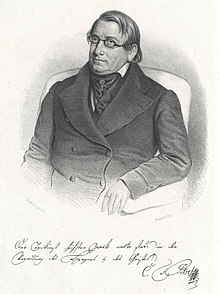Carl Franz Pitsch
Carl Franz Pitsch , also: Karel František (born February 5, 1786 in Batzdorf , † June 12, 1858 in Prague ) was an Austrian organist and composer.
Life
Pitsch received his first piano and organ lessons from his father and from 1794 in Silesia with the Reichenbach organist K. Bach. After attending the high schools in Jitschin and Neuhaus , the organist Franz Otto from Glatz taught him counterpoint, piano and organ.
After studying philosophy at Charles University in Prague, he worked from 1815 to 1826 as a music teacher in the family of Michael Ritter von Manner in Bohdalitz in Moravia . During this time he made friends with Simon Sechter in Vienna .
Pitsch moved to Prague in 1826, became organist at St. Nicholas' Church in 1832 and director of the Prague Organ School in 1840. The Prague Association for the Promotion of Music, the Cecilia Academy, the Sophia Academy and the Salzburg Mozarteum appointed him honorary members (1845).
As a master of counterpoint, Pitsch was the last representative of the post-baroque organ art in Bohemia. Numerous students carried his teaching and his work around the world and determined the development of church music, especially in Bohemia. Pitsch said about his work: "The art of music always has the highest purpose in refining the heart and mind". Of his numerous works, only a few organ pieces and a mass have survived; However, these prove his high compositional rank.
Works
- Missa D for mixed choir and orchestra
- Te Deum for mixed choir and orchestra
- Requiem for mixed choir
- Graduates
- The grave ( Salis ), song
- 6 contrapuntal changes to the Austrian folk anthem for organ
- 6 preludes op.6
- Figured bass exercises and figured bass part from JS Bach's cantata
- "Alleluja, paschale", fugue for organ
literature
- Constantin von Wurzbach : Pitsch, Karl Franz . In: Biographisches Lexikon des Kaiserthums Oesterreich . 22nd part. Imperial-Royal Court and State Printing Office, Vienna 1870, pp. 370–372 ( digitized version ).
- Uwe Harten : Pitsch (Pič), Karl (Karel) Franz. In: Oesterreichisches Musiklexikon . Online edition, Vienna 2002 ff., ISBN 3-7001-3077-5 ; Print edition: Volume 4, Verlag der Österreichischen Akademie der Wissenschaften, Vienna 2005, ISBN 3-7001-3046-5 .
Web links
- Works by and about Carl Franz Pitsch in the German Digital Library
- Sheet music and audio files by Carl Franz Pitsch in the International Music Score Library Project
| personal data | |
|---|---|
| SURNAME | Pitsch, Carl Franz |
| ALTERNATIVE NAMES | Pič, Karel František; Pitsch, Karl Franz |
| BRIEF DESCRIPTION | Bohemian organist and composer |
| DATE OF BIRTH | February 5, 1786 |
| PLACE OF BIRTH | Batzdorf |
| DATE OF DEATH | June 12, 1858 |
| Place of death | Prague |
